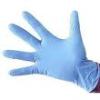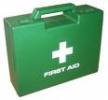
UK Employers Adjusting to New First Aid Guidance
The Health and Safety Executive revised its training regime on Oct. 1, 2009, to give employers more flexibility in how they train workers to provide first aid during emergencies. It says someone should be appointed to look after first aid supplies, including medical gloves.
- By Jerry Laws
- Apr 01, 2010
The Health and Safety Executive does not mandate a specific list of items that must be in employers' first aid kits, but it says at a minimum, kits should contain a pair of disposable gloves, bandages, two large sterile wound dressings, and six medium-sized wound dressings. The agency, equivalent to the U.S. Occupational Safety and Health Administration, also says employers should appoint someone in the workplace to look after first aid supplies, if the decision is made not to have a fully trained first aider at the job site. For the latter, HSE requires they hold a valid certificate of competence from an approved first aid at work (FAW) or emergency first aid at work (EFAW) training organization.
HSE revised its training regime on Oct. 1, 2009, to give employers more flexibility in how they train workers to provide first aid during emergencies. Training taken outside Great Britain is not approved, and there are specific requirements for the content of both types of training by certified training organizations.
First aiders should wear disposable gloves when dealing with blood or any other body fluid, according to HSE's "Blood-borne viruses in the workplace" leaflet, which also recommends that they wear suitable eye protection and a disposable plastic apron if splashes are possible.
EFAW training enables the trained person to give emergency first aid to someone who is hurt or becomes ill at work. FAW training includes EFAW and also equips the worker to apply first aid to various specific injuries and illnesses.
 HSE recently published a first aid at work assessment tool that employers can use to determine how many and what type of first aid personnel are needed at their workplaces. The tool is available here; posters, lists of training organizations, leaflets about latex allergies and basic first aid, and other resource material is available at no charge from the agency.
HSE recently published a first aid at work assessment tool that employers can use to determine how many and what type of first aid personnel are needed at their workplaces. The tool is available here; posters, lists of training organizations, leaflets about latex allergies and basic first aid, and other resource material is available at no charge from the agency.
HSE is responsible for the Health and Safety (First-Aid) Regulations 1981 and the Offshore Installations and Pipeline Works (First-Aid) Regulations 1989, which means the agency:
- reviews and maintains the Regulations, Approved Codes of Practice and guidance;
- enforces the Regulations;
- responds to requests for information and advice; and
- approves training organizations providing first aid at work, offshore first aid, or offshore medic courses.
HSE strongly recommends annual refresher training for all employees trained in first aid.
In its checklist for assessing first aid needs, HSE says those with workplaces with higher hazard levels should consider additional first aid supplies that is staged based on a risk assessment, and if employees travel frequently or work remotely or alone, personal first aid kits should be considered. Adequate supplies should be available to employees on all shifts, it says.
About the Author
Jerry Laws is Editor of Occupational Health & Safety magazine, which is owned by 1105 Media Inc.